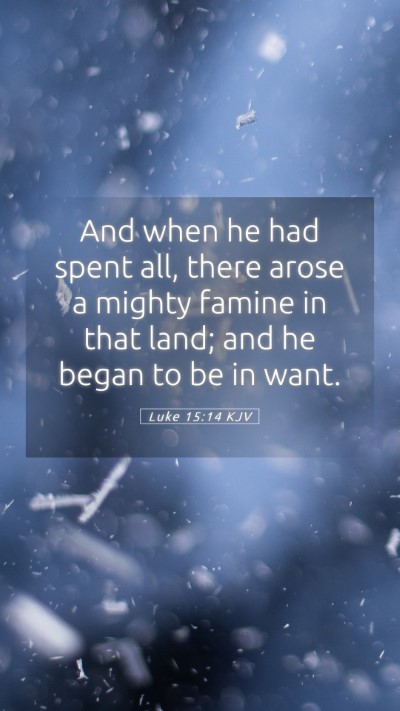Understanding Luke 15:14
In Luke 15:14, we encounter a poignant moment in one of Jesus' parables, where a prodigal son experiences the consequences of his reckless living. This verse serves as a critical point in understanding the themes of repentance, grace, and the father’s love in the context of biblical teachings.
Bible Verse Meaning
Luke 15:14 states: "And when he had spent all, there arose a mighty famine in that land; and he began to be in want." This verse signifies a turning point in the narrative of the Prodigal Son, illustrating the harsh realities of life without proper guidance and the need for humility and restoration.
Bible Verse Interpretations
- Loss and Desperation: Matthew Henry highlights the spiritual emptiness that often follows a life led by indulgence, suggesting that this famine represents a deeper spiritual drought.
- The Consequences of Sin: Albert Barnes notes that the after-effects of the son’s choices bring about an inevitable realization of his missteps, prompting him to return to his father.
- Divine Providence: Adam Clarke points to the famine as a representation of divine intervention, which serves to bring the wayward individual back to a place of reckoning and repentance.
Bible Verse Understanding
The understanding of Luke 15:14 extends beyond mere narrative. It encapsulates the human condition and our propensity toward rebellion against God. It serves as a reminder of the futility in pursuing worldly pleasures, emphasizing the need for spiritual fulfillment.
Bible Verse Commentary
Commentators suggest that the Prodigal Son's journey into want serves as a metaphor for humanity's spiritual journey. The initial rejection of paternal guidance leads to a profound understanding of one’s need for reconciliation with God, much like the son’s eventual return to his father.
Scripture Analysis
Analyzing the contextual elements surrounding Luke 15:14, we see the father figure representing God, who patiently waits for His children to return. The famine and subsequent need highlight God’s allowing of consequences to direct wayward souls back to Him. This reflects the hope and the overarching theme of redemption within the Scriptures.
Biblical Exegesis
Through exegetical study, one can discern that the famine is not merely a historical event, but a spiritual metaphor illustrating the consequences of sin and the longing for reconciliation with God. Luke 15:14 acts as a mirror reflecting human despair contrasted with divine grace.
Bible Study Insights
Engaging deeply with this verse during a Bible study can evoke vital discussions regarding our spiritual journeys. Participants might explore questions of personal rebellion, the nature of God’s love, and the process of repentance.
Meaning of Bible Verses
Understanding the meaning of Luke 15:14 encourages believers to examine their own lives regarding dependence on God versus self-reliance. It challenges us to recognize our spiritual famine when we stray from the path of righteousness.
Cross References
- Luke 15:11-32: The entire parable of the Prodigal Son, providing context for the verse.
- Matthew 5:6: "Blessed are those who hunger and thirst for righteousness, for they shall be filled." A reflection on spiritual hunger versus worldly hunger.
- Isaiah 55:1: An invitation for the thirsty to come and be filled, paralleling the need for spiritual sustenance.
In Conclusion
Luke 15:14 serves as a powerful reminder of the consequences of a life lived apart from God and the hope of redemption that He graciously offers us. As we delve into Bible study resources and engage with this passage, let us seek deeper Bible study insights and personal application to our faith journeys.


